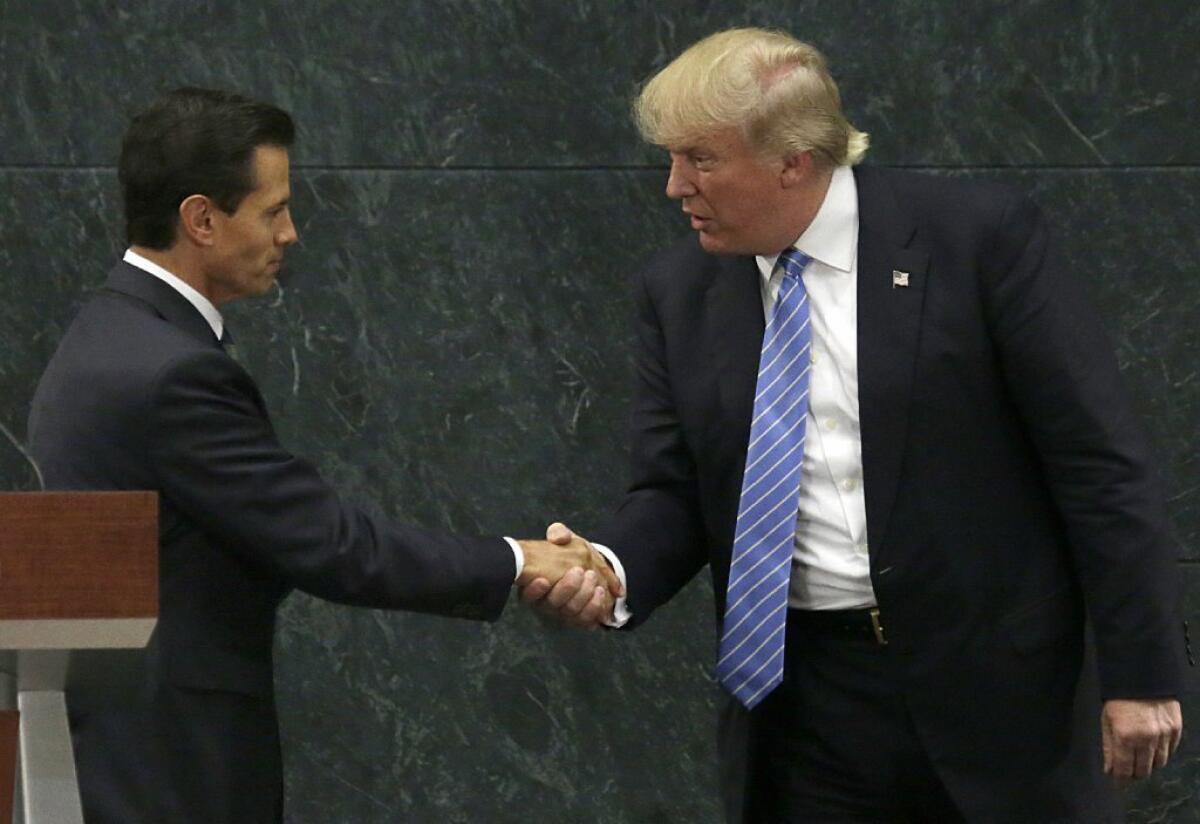World leaders worry about what President Trump will do

- Share via
Reporting from Washington — At foreign embassies across Washington, envoys say they are bracing for the unknown when President-elect Donald Trump is sworn into office Friday and starts issuing orders.
In capitals around the globe, leaders and foreign policy experts worry that Trump’s calls for radical change and brash style could produce instability or worse in a global crisis.
They are confused by his scattershot fusillade of provocative tweets and worry that he may upend long-held alliances, treaties and international organizations.
From Mexico to China, rarely before has an incoming American president so discombobulated the rest of the world, allies and adversaries alike.
“Trump is a mercurial figure,” said John Herbst, a former U.S. diplomat who now heads the Eurasia Center at the Atlantic Council, a think tank based in Washington, stating the obvious.
Last weekend, Trump gave interviews to two newspapers, one British and one German, in which he said he was indifferent to the fate of the European Union political and trading bloc, and argued that the NATO military alliance, the bedrock of European security since World War II, is obsolete.
Both have been pillars of transatlantic cooperation for decades and helped produce peace and prosperity both in Europe and in the United States.
“We just don’t know,” is how one Washington-based envoy said his embassy usually explains Trump’s comments and tweets in cables back home. The diplomat was not authorized to speak publicly about American politics.
It hasn’t helped that many of Trump’s designated Cabinet members, especially his choices for Defense and State, as well as U.S. ambassador to the United Nations, distanced themselves from Trump on the threat from Russia, the future of NATO, the need to keep the Iran nuclear deal, the danger of global warming and other issues.
Europeans, in particular, are nervous about Trump’s repeated praise for Russian President Vladimir Putin, who is widely viewed with alarm for sending his troops into Ukraine and up against NATO’s borders, and for trying to interfere with Western elections.
Allies also have yet to get clarity about Trump’s comments last year suggesting that Japan, South Korea and other nations should build nuclear weapons for their own defense, a policy that would end decades of U.S. nonproliferation efforts.
If Trump’s signals are mixed and fuzzy, the consequences are coming into focus.
After he called German Chancellor Angela Merkel’s decision to admit thousands of Syrian refugees a “catastrophic mistake,” she said it was clear Europe had to think about going it alone, or at least without the United States as a reliable partner.
Merkels’ French colleague, President Francois Hollande, echoed her.
“Europe will be ready to pursue transatlantic cooperation, but it will based on its interests and values,” Hollande said. “It does not need outside advice to tell it what to do.”
The French minister of foreign affairs, Jean-Marc Ayrault, went further, challenging Trump’s eagerness to champion Britain’s decision to withdraw from the European Union and his open cheer leading for the EU to dissolve.
“The best response is European unity,” Ayrault said. “The best way to defend Europe is to remain united. This is a bit of an invitation that we are making to Mr. Trump. To remain a bloc. Not to forget that the force of Europeans is in their unity.”
China also has had trouble making out what Trump intends. But Beijing has wasted no time in flexing its own muscles.
In another sign of a new world order, Chinese President Xi Jinping, a communist, became the poster child for free trade at this week’s annual meeting of the world’s top entrepreneurs, political leaders and others jet-setters in Davos, Switzerland.
Xi assumed a role that normally would have gone to an American — a void left, some say, by Trump’s all-over-the-map declarations about ripping up trade agreements and challenging China’s currency and economic policies.
Trump acts “stunningly confident in his ostensible knowledge of the job, though he speaks like a rookie,” said the People’s Daily, China’s Communist Party daily.
In Mexico, a special target of Trump’s vitriol during the campaign last year, the mood is nothing short of panic. The government quickly named a new ambassador to Washington, replacing one who had just taken the post last year.
Mexico’s economy minister, Ildefonso Guajardo, warned this week that Trump’s policies could lead to a global recession. He said Mexico will attempt to tie its cooperation on security and immigration to better trade treatment from the new administration.
Trump has threatened to impose huge tariffs on imports of Mexican goods, while vowing to add punitive taxes to U.S. companies that move factories to Mexico.
Trump’s election has helped send the Mexican economy downward and President Enrique Peña Nieto, who received Trump last year at the presidential residence in Mexico City, has seen his approval rating sink to historic lows.
In an unusual move, three foreign ambassadors took part in a live radio program Thursday in Washington to discuss their governments’ dealings with the incoming administration.
The strains were clear between the anodyne remarks about looking forward to working with the new administration.
David O’Sullivan, the European Union envoy to the U.S., was in the most difficult spot. He said he expected Trump eventually will become aware of the crucial relationship between Washington and the 28-nation continental bloc.
“If we don’t get it right, there will be huge consequences for us all,” he added.
For more on international affairs, follow @TracyKWilkinson on Twitter
More to Read
Sign up for Essential California
The most important California stories and recommendations in your inbox every morning.
You may occasionally receive promotional content from the Los Angeles Times.











